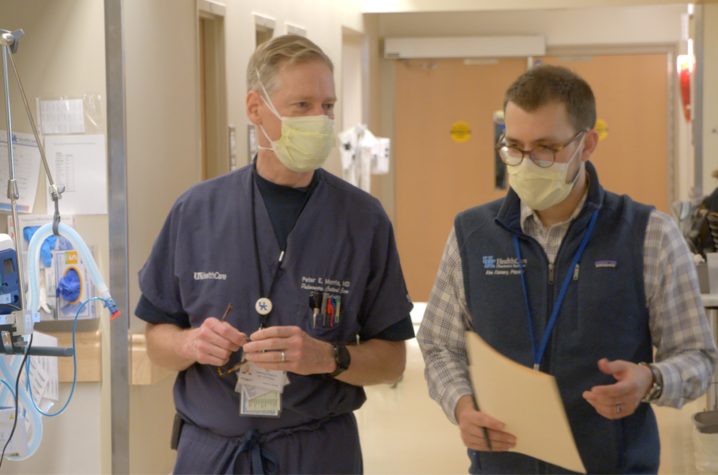Pharmacy Professor in Search of Treatments for Acute Kidney Injury
LEXINGTON, Ky. (July 8, 2021) — Alex Flannery worked as a clinician in the intensive care unit for six years. During his tenure in critical care, the University of Kentucky College of Pharmacy assistant professor and 2011 graduate, saw many cases of sepsis and acute kidney injury, which have no cure. Flannery’s background in pharmacology sparked an interest in learning more about how to treat these diseases.
“I want to better understand the physiological processes of sepsis and acute kidney injury,” Flannery said. “What happens to the body? What treatments can we use? Are there any current medications that we can repurpose to treat these conditions?”
Flannery then made the transition to becoming a clinical researcher. He credits the multidisciplinary nature of care at the hospital for his success in a smooth transition from clinician to researcher.
“As a pharmacist, I worked with physicians, nurses and lots of other health care professionals to optimize patient care,” he said. “The focus on improving outcomes is very apparent in the research setting as well, which has benefited me in my transition.”
Flannery currently works with patients who have sepsis and are experiencing acute kidney injury.
“Sepsis is when you get an infection, and your body’s immune system reacts very poorly to it. It is, by definition, a life-threatening event,” he said. “We want to study what happens when you have kidney injury on top of that.”
Working with actual patients allows Flannery to experience an up-close look at how sepsis can take a toll on the body.
“Sometimes, research involves looking at what happens to these patients and the risk factors they may have,” he said. “Other times, it involves getting biospecimens from them and looking at different things to see if we can understand mechanisms better. And sometimes, it involves giving those patients medicine — either within the context of a clinical trial or otherwise — and seeing how certain changes happen.”
Flannery is researching the role of a complex hormonal system called the renin-angiotensin system in sepsis-associated acute kidney injury. The renin-angiotensin system, or RAS for short, is a target of certain drugs used for blood pressure control.
“We collect specimens from patients that have sepsis and kidney injury and look at this complex profile of the system,” he said. “It’s like a Rubik’s Cube. You have it perfectly set up, and this disease comes along and twists it all out of order. We are looking to see exactly what those alterations are in that complex profile.”
Flannery credits much of his success to his education. He completed his pre-pharmacy studies from UK before furthering his education at the UK College of Pharmacy, where he also completed clinical training in critical care at UK HealthCare. He recently completed his doctorate in clinical and translational science from the UK Center for Clinical and Translational Science program in May of 2021.
“I feel very supported here. There is a lot of synergy between UK HealthCare and the university. Health care can learn from research just as much as research can learn from health care,” Flannery said. “Being able to see patients and study patients in a way that is 5-10 minutes away from research space really facilitates the type of infrastructure that you need, in addition to the collaboration.”
When asked what advice he would give to current students, Flannery says the greatest part of the effort comes with preparation.
“Every study can make a contribution to society, whether it’s positive or neutral necessarily,” he said. “Focus on your methods, sell your methods, and let that really be the energy which drives your research project.”

As the state’s flagship, land-grant institution, the University of Kentucky exists to advance the Commonwealth. We do that by preparing the next generation of leaders — placing students at the heart of everything we do — and transforming the lives of Kentuckians through education, research and creative work, service and health care. We pride ourselves on being a catalyst for breakthroughs and a force for healing, a place where ingenuity unfolds. It's all made possible by our people — visionaries, disruptors and pioneers — who make up 200 academic programs, a $476.5 million research and development enterprise and a world-class medical center, all on one campus.




